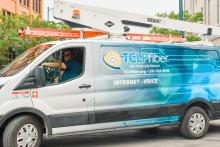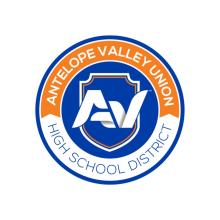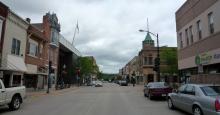
Decorah, Iowa is moving forward on a long-percolating plan to expand the city’s core fiber ring to provide affordable broadband access to long-neglected residents and businesses.
While the project has been discussed for years, local officials tell ISLR the project gained renewed momentum during peak COVID, and is creeping closer to launch.
Contracts are still being finalized as the city hopes to spend somewhere around $12 to $15 million to deliver fiber to all 3,000 potential subscriber locations. The full project would take about three years to deliver fiber to all 7,740 city residents, with the first subscribers potentially coming online this fall.
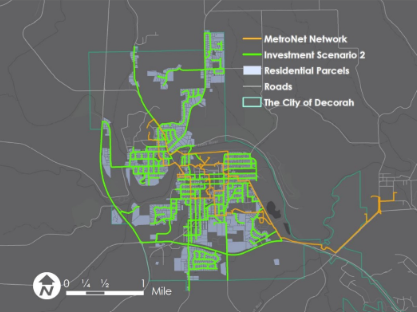
“Decorah has been in pursuit of fiber to the premises for the last 8 to 9 plus years and we finally have broken through some of our challenges on how to get to the finish line,” Chopper Albert, Decorah IT Director told ISLR.
According to Albert, Decorah’s recent progress is thanks in part to new City Manager Travis Goedken, who has long advocated for expanding the city’s existing fiber network to drive affordable fiber access citywide.
New City Management Team Pushes Forward
Since 2013 the city has owned an 11-mile core fiber network, dubbed the Decorah MetroNet. MetroNet was born out of frustration after a major flood in 2008 across much of Iowa resulted in prolonged communications network outages.
MetroNet (not to be confused with the Indiana-based ISP that goes by the same name) currently provides access to Luther College and 18 additional government buildings and anchor institutions.
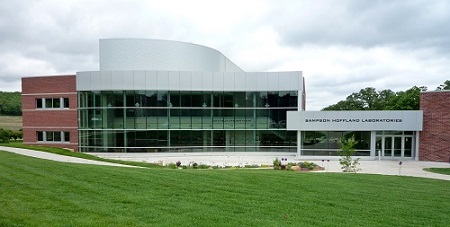
By 2015, city officials began wondering if they wouldn’t be well served by putting an excess of city dark fiber to work by expanding access to all local residents and businesses, particularly given widespread public anger at the high costs, spotty service, and slow speeds provided by the regional monopolies Mediacom and Lumen (formerly Centurylink). For most of the city, Mediacom is the only broadband option at anything close to current generation speeds.
Lumen provides service to somewhere around 13 percent of the city, but largely via outdated DSL lines that often fail to even meet the FCC’s dated definition of broadband (25 megabit per second (Mbps) downstream, 3 Mbps up).
“People wanted better service, cheaper prices, and faster, more reliable connections,” Albert said. “And they just weren't getting that with Mediacom.”
Mediacom covers roughly 87 percent of the city, and has a long history of leveraging its political influence to try and derail community owned and operated broadband builds, often by actively misleading local voters. The cable giant recently lobbied (unsuccessfully) for a new state law that would all but ban the funding and construction of such locally-owned networks.
“In 2013 Mediacom flew in their legal team from New York and offered to buy the MetroNet out from us,” Albert said. “I think they saw the writing on the wall back then.”
Centurylink and Mediacom have some of the worst customer satisfaction ratings of any industry in America. And they’ve repeatedly justified their sluggish speeds by insisting that local municipalities don’t actually need next-generation speeds.

“We've had some ups and downs with them,” Albert said. “They're like: you don't need a gig. We currently have 10 gig pipes that feed the MetroNet. That's shared between those five entities.”
“They keep raising their prices, the customer service isn’t there, they charge overage fees and data caps, and you hear people complain about ‘I have buffering’ and this sort of thing,” Albert said. “I think it’s just a mixture of that sort of thing that pushed it to the limits.”
In November of 2015, that frustration was converted into action, when 94 percent of Decorah voters cast ballots in favor of the formation of a municipal telecommunications utility. While progress on taking things further stalled for a few years after, COVID frustrations and a new city council have ended the project gridlock.
“The last two years have seen a big stride forward,” Albert said. “We got a new city management team in. And while the pandemic kind of obviously pushed this too, our City Council has made fiber to the premise their number one priority and has been pushing very hard on it.”
Rock, Smart Meters, And A Plan
According to Albert, the city is likely to take out a 20 year loan to fund the $12 to $15 million fiber network, which will be owned by the city but managed by Acentek.
“We have an agreement that they will do all of the operations, installs, and billing on behalf of the city,” Albert noted.
As it currently stands, the city hopes to deploy the network in increments over the next three years in somewhere around ten different deployment chunks. Once contracts are in place, city leaders say they expect the first initial target–a small subset of around 150 locations–should be able to get service sometime this fall.
It was important to city leaders to maintain ownership of the finished network, avoiding the pitfalls of some public-private partnerships (PPP)–where the city often has little say on the trajectory, rates, or management of the completed network.
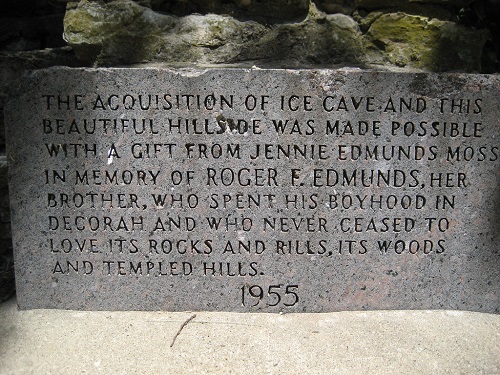
Albert said one major challenge for the city will be the heavy amount of rock in the area.
“We're in the Bluffs,” he said. “Being in this crater, a large portion of town is going to be all rock as we drill. So that's where the major cost of this has been a thorn for us because we know we're going to have probably several million dollars in rock drilling versus just normal boring.”
City officials believe the cost and difficulty will be well worth it. Not only because of the access local residents and businesses will have to affordable fiber, but because the upgrades will allow for the upgrading of dated city SCADA and water meter systems, only a third of which can currently be monitored without a direct visit to the actual water meter.
“Sometimes we don't know for a couple of months that we have problems because we're not collecting that data,” Albert said. “That's why we are going to hit every premise off the bat, whether they sign up or not.”
The city has also reached out to the local electric and gas utilities to provide them access for their own smart-metering improvements, driving additional cost savings and efficiencies.
Decorah officials urge interested locals to “take the Decorah pledge” and register at the city’s website, ensuring they’re first in line for service with free installation.
Iowa A Hotbed Of Grass Roots, Telecom Monopoly Alternatives
Iowa has been a hotbed of municipal fiber deployments, many of which have inspired Decorah’s renewed interest in building its own fiber network.
Waterloo, Iowa, population 67,695, recently took steps to begin building its own $115 million fiber network in a bid to drive down consumer costs. Other cities, like Waverly, have had success providing the public affordable fiber in conjunction with the city-owned utility (we profiled Waverly in Episode 493 of the Community Broadband Bits Podcast).
Decorah officials say they were also inspired by the steady progress made by Fort Dodge, where residents in 2019 approved the creation of a municipal broadband utility after decades of frustration with substandard broadband access by that city’s own regional duopoly: Mediacom and Frontier Communications.
“With a municipal telecommunications utility, the decisions are made in your community,” SmartSource Consulting’s Curtis Dean said shortly after the utility’s creation.
“They’re not made in Middletown, New York, [headquarters of Mediacom] or wherever Frontier is based. They’re made by local people, and the decisions are made for the benefit of the community, not necessarily for anybody outside of the community.”

Due to changes lobbied for by Mediacom and other telecom giants in 2004, Iowa state law prohibits the use of tax dollars to directly fund a telecommunications utility. As a result, deployments in cities like Decorah and Fort Dodge must be funded predominantly through user subscription fees.
Ultimately, Decorah city officials expect that even users that don’t sign up for the city’s fiber service will benefit, given such competition usually forces Mediacom to finally lower rates.
“We are fully expecting Mediacom to slash their prices,” Albert said. “They did that in Waverly, Iowa. Waverly is well into year seven [of their own municipal broadband build]. Waverly's advantage is they have an electric utility that obviously helps cover some of their costs.”
Waterloo, Waverly, Fort Dodge, and Decorah are on the cutting edge in Iowa of taking on monopoly power and treating affordable fiber as an essential priority. Albert said other cities, like Charles City, Iowa–just ten miles down the road–are watching closely and may ultimately follow suit.
“It’s been a very long road,” Albert said. But city leaders and locals alike believe it will be worth the wait.
*A previous version of this story incorrectly identified the title of SmartSource Consultant Curtis Dean. The story was also updated to clarify how Fort Dodge created a broadband utility and the way state law dictates how such utilities are funded in Iowa.
Header image of Downtown Decorah, Iowa courtesy of Wikimedia Commons, Attribution 3.0 Unported (CC BY 3.0)
Inline image of Sampson Hoffland Laboratories at Luther College in Decorah, Iowa courtesy of Wikimedia Commons, Attribution 3.0 Unported (CC BY 3.0)
Inline image of Ice Cave inscription courtesy of Flickr user Denise Krebs, Attribution 2.0 Generic (CC BY 2.0)


